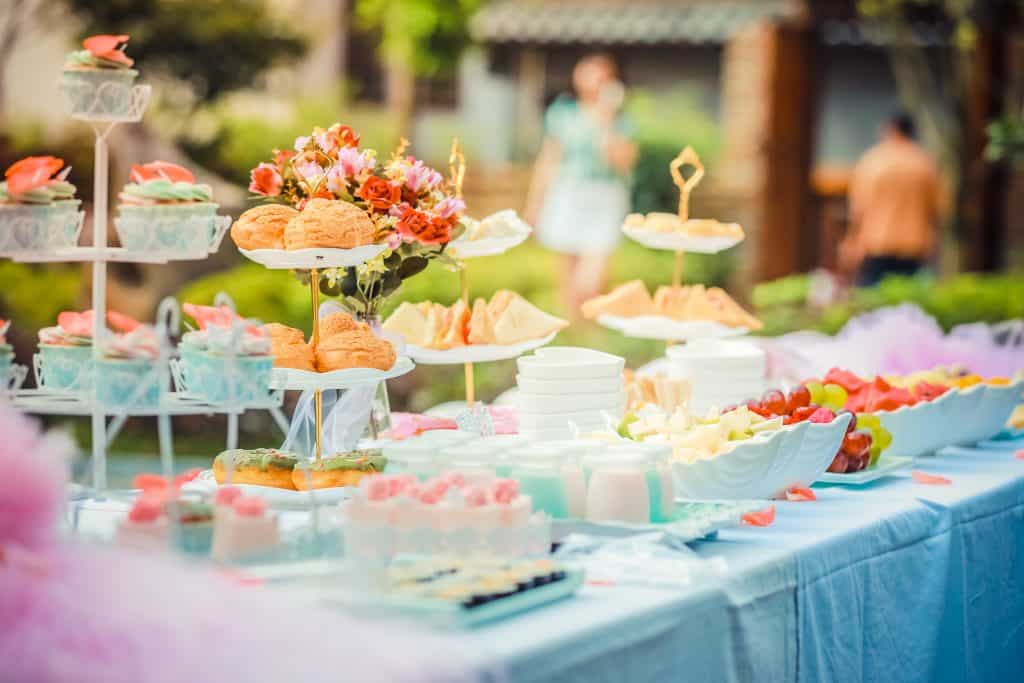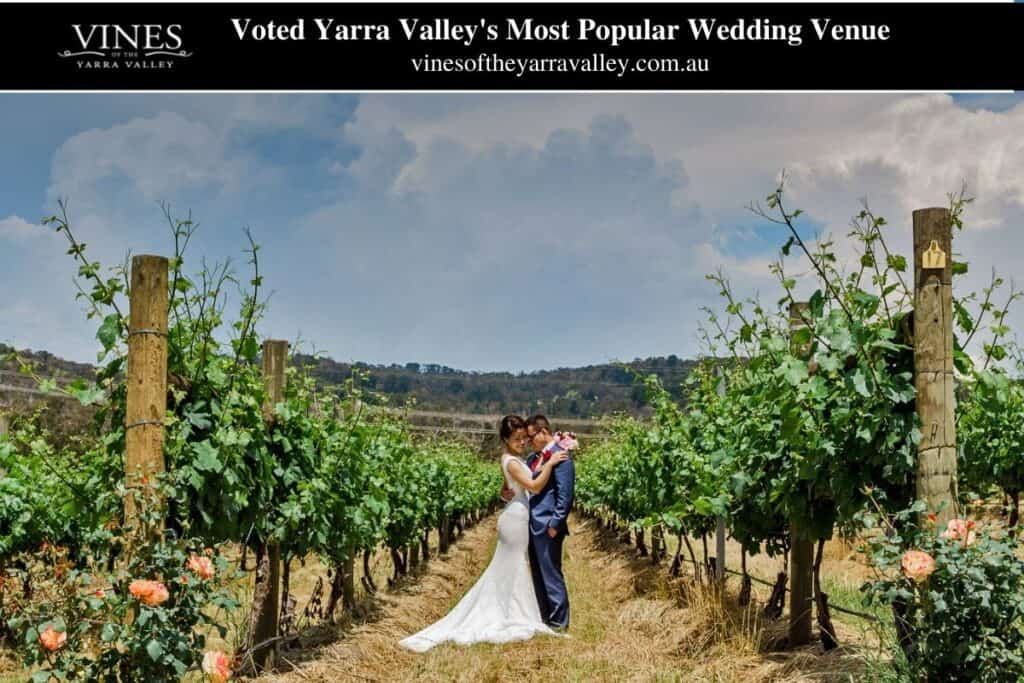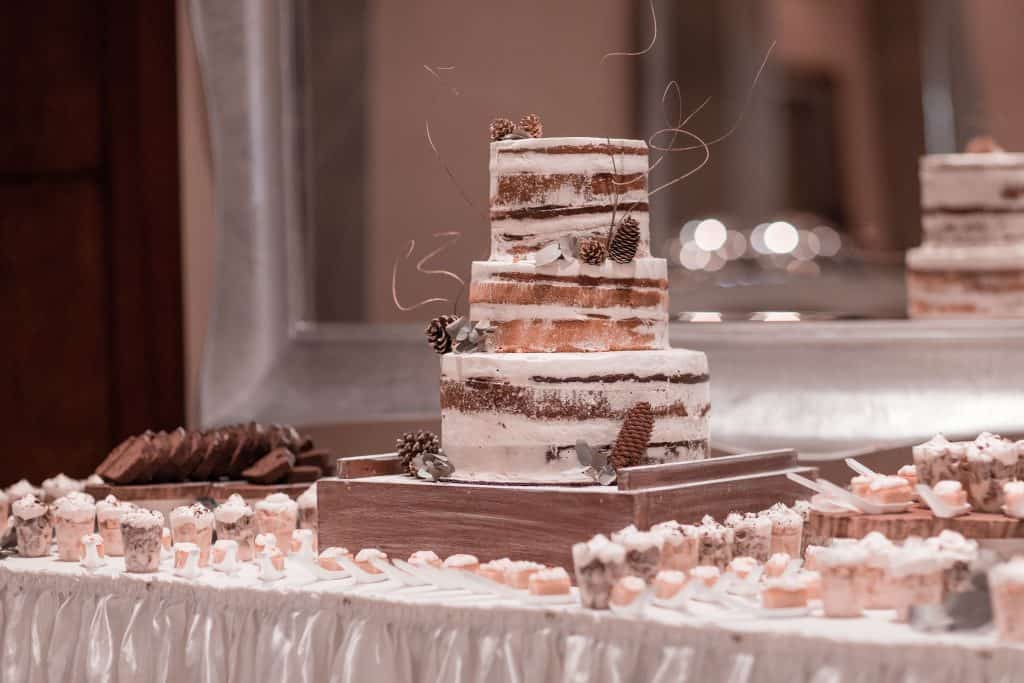We've noticed that catering, especially for first-time customers, can be a bit daunting. Whether you're a business ordering for a meeting or a newly engaged couple organising your dream wedding, you can streamline your caterer and save money.
In spite of this, it might be difficult to narrow down the alternatives when faced with hundreds of tempting dishes available from a wide variety of menus. As a result, we decided to provide a few easy-to-implement suggestions for making a difference.
Table of Contents
Catering Service Definition
Providing food and drink at off-site locations, including hotels, hospitals, cruise ships, and special occasions like weddings, is what caterers do for a living. Therefore, a wedding caterer is a company engaged either as part of an all-inclusive wedding package or separately to supply food and drinks for the wedding reception.
Looking for Wedding Caterers in Melbourne? Look no further; Vines of the Yarra Valley has you covered.
Timeline of Catering Services
It wasn't until 1778 that we even heard of the first large-scale catering operations. Around 1820, the catering industry grew, and African Americans quickly became the majority of the industry's founders. Competence in the catering industry can be traced back to Robert Bogle, sometimes called the "originator of catering."
In the 1880s, as the number of caterers listed in local directories increased, the term "caterer" entered regular usage. During World War II, catering was widely used due to the rationing system.
Eating out at public catering establishments surpassed eating at home by the 1960s when many businessmen had turned to cater as a means of survival in a postwar economy.
So, You've Decided to Hire a Caterer; What Can You Expect?
Different caterers may offer different services, but in general, they are responsible for supplying both the meal and the serving utensils. Your caterer may also be able to supply essentials like cutlery, plates, and tablecloths that the venue doesn't offer.
Choosing an excellent caterer for a wedding should be enjoyable, easy, and quick. The best caterers will also offer help with event planning so that you can rely on them for everything from venue selection to floral arrangements.
In the beginning, you and your caterer will likely have a relaxed talk without pressure to decide. The caterer's job is to learn what you like and don't like, and this can be done over the phone or in person, depending on your preference and the caterer's availability.
Check the caterer's availability after you have a sense of what you need. It's a good idea to contact the event spaces your caterers have previously worked at to find out who they recommend. Feedback from past customers who have worked with the caterer is always appreciated.
While some event locations are equipped with their catering staff, others, notably generic conference centres, are only buildings. There shouldn't be any issues adapting your caterer's services to the location of your wedding. Your caterers will take care of all the details, so you don't have to worry if the venue you're considering has a kitchen.
Last but not least, your caterer should have some sort of culinary speciality. Your wedding meal could feature traditional or contemporary fare, depending on your preferences. Your caterer should be able to give you a ballpark figure for the bill by now; if it's acceptable, you should say so right away.
Vines of the Yarra Valley has proven to be an iconic wedding venue and function centre in Melbourne. Book today so you don’t miss out.
Exactly What Does “Wedding Catering” Entail?
Whether an intimate gathering or a grand celebration, weddings require catering services of varying scope and complexity. A simple wedding allows the caterers to circulate freely with food and drink, allowing each guest to indulge in their personal preferences. Caterers will be less numerous than during a lavish wedding. Contrarily, the number of caterers needed for a large event will drive up the price. They circulate among the visitors, serving them as they come, while a buffet stands ready for them to help themselves.
Learn the various catering options as a first step. When comparing the various types, keep in mind that the planning, price, and ordering processes vary slightly amongst them. Once you've settled on one of them, you'll have fewer options to consider when placing your order, which will save you time and money. The most common kinds of catering are as follows:
In this part, we will discuss the many catering service styles that can be used at a wedding.
Serving Platter
Plated dinners, the gold standard of formal dining, are consistently voted the most prefered choice. With this style of catering, diners select their meal from a limited menu while remaining seated at their tables. Waiters and waitresses are on hand to serve guests. Although it requires more work on the host's part in organising the menu, this style of catering is the only one that can give a reception the air of formality and organisation it needs. The price of serving meals a la carte can be difficult to predict.
A plated supper is the standard fare on formal occasions. To put it simply, guests will place their orders ahead of time (or once they have been seated at the reception), and wait staff will bring out their food in stages. Your guests will be able to interact comfortably without interrupting their conversations to obtain an additional roll or a serving of mash. You should be aware that it is typically the most expensive option, so choose your dishes with care.
Buffet
All the meal options are laid out in a row, on long tables, and in a buffet. Most buffets have servers standing behind it to help guests find what they're looking for, explain any food allergies they may have, and serve the right amount of food. If there will be a lot of guests, it is typical to have two buffet tables. The buffet should stay open long enough for everyone to make at least one round through it, and then those who still have an appetite can make another journey.
The buffet is another time-tested favourite. It is more common for informal gatherings, but a gourmet touch can be added if desired. The cost of this wedding catering option is typically lower than that of plated meals, and guests get the extra convenience of building their meals (minimising waste). Easy-to-serve foods are recommended, as a line of eager guests will likely wait for you to fill their plates.
Food Stations
It's likely that food stations are the most modern and hip approach to wedding catering. They allow your visitors to be creative in the preparation of their meals. In what way does it function? Your guests will take turns walking to the numerous food stations spread out about the venue, each serving a particular sort of food (maybe one station is dedicated to bread and cheeses, while another serves just salads).
Since food stations may stay open for much longer than a buffet and are just as gratifying as a seated or plated meal, they have become a highly popular catering concept for weddings. Different tables, sometimes organised by category, offer a variety of foods at a food station, rather than everything in one long line like at a buffet. A wedding station is a creative approach to serving guests and incorporating the wedding's theme into the meal.
Family Style
A family-style reception is similar to a sit-down meal in that attendees are assigned a table and served by wait staff. Dinner is served family style, with large servings placed on serving platters and visitors urged to help themselves. It's like having dinner with your loved ones at home.
Do you want to create a warm and welcoming atmosphere at your beach wedding reception? Make your wedding catering more intimate by serving food family-style. The mash, fresh vegetables, Yorkshire puddings, and roast all work wonderfully as a shared dish during a Sunday feast. Place them on wide plates for guests to share and encourage them to help themselves. This eliminates the need for them to wait in long lines at the food stands.
Cocktail Style
A new trend in catering has been to provide hors d'oeuvres and other little snacks all throughout the event, rather than having guests sit down for a single dinner. The hors d'oeuvres are little bites of food served either hot or cold. Servers can bring the food to the tables or set it out in a central location for visitors to help themselves. This is a great option for couples who want their guests to be able to relax and interact in an informal setting.
If you don't want to spend a lot of money, a standing reception is a great alternative to a banquet. More variety and creativity in the menu is possible because of the need for quick-to-serve cocktail fare rather than full-course plated meals at this type of event. You can save a few pounds by opting for a canapé spread instead of a full meal.
How Do You Recognise a Quality Caterer?
Becoming a well-known company that offers wedding catering services is not simple. What, therefore, are the essential qualities of a reliable catering firm? Good catering services, like any other industry, value and promote the values of hard effort, determination, honesty, proper training, discipline, and polished abilities among its employees. There are other qualities that make a catering service excellent, however:
Producing Safe and Delicious Food
Catering, first and foremost, is about satisfying people's appetites. No matter how fancy or gorgeous the wedding site is, they aren't competent caterers if the food isn't cooked well. Food preparation expertise is essential for caterers, as you don't want to disappoint your visitors with a meal they don't enjoy. Cuisine safety is just as crucial as making delicious food.
Focusing on the Customer
Customers are more likely to remain loyal to a business that provides exceptional service. If you want to impress your guests, make sure the caterer you hire is diplomatic, kind, and nice to them. The best caterers treat their customers with respect and use polite language when communicating with them. In order to better communicate with their clients, caterers should provide a detailed menu outline. They should communicate any changes immediately.
Collaborating Effectively
A professional caterer will know how to manage their staff of waiters, hosts, and kitchen staff. Working as a team is essential for the success of any organisation, catering included. Good leaders don't merely bark orders; they set an example. The individual in charge of your catering needs to manage their staff effectively and act swiftly when necessary.
Offering Beverages
When it comes to catering, beverages are just as essential as cuisine. When paired with the correct beverage, a wonderful meal may truly shine. The safety of the guests should be the caterer's top priority, so it's important that they serve not only drinks but drinks of high quality.
Having the Ability to Adapt
An accommodating caterer can shift their services to meet the demands of their customers. Your caterer should be prepared for a wide variety of scenarios, as no two clients or occasions are the same. They should have no trouble meeting requests, such as a last-minute menu swap owing to special dietary needs.
To put it simply, the quality and experience of the caterer you pick will have the greatest impact on the success of your wedding reception. With the help of an experienced caterer, you can choose which type of food is best for your event. Find a reliable caterer and rely on their advice to make the appropriate choice; there's no need to guess.
Conclusion
A wedding caterer is a company engaged either as part of an all-inclusive wedding package or separately to supply food and drinks for the wedding reception. It wasn't until 1778 that we even hear of the first large-scale catering operations. During World War II, catering was widely used due to the rationing system. Whether an intimate gathering or a grand celebration, weddings require catering services of varying scope and complexity. A simple wedding allows the caterers to circulate freely with food and drink, allowing each guest to indulge in their personal preferences.
Caterers will be less numerous than during a lavish wedding. Plated dinners are the gold standard of formal dining. With this style of catering, diners select their meal from a limited menu. The buffet is another time-tested favourite for informal gatherings. Easy-to-serve foods are recommended, as there will be eager guests waiting for you to fill their plates.
Food stations are the most modern and hip approach to wedding catering. They allow your visitors to be creative in the preparation of their meals. Different tables, sometimes organised by category, offer a variety of foods at a food station. This eliminates the need for them to wait in long lines at the food stands. If you don't want to spend a lot of money, a standing reception is a great alternative to a banquet.
Food preparation expertise is essential for caterers. If you want to impress your guests, make sure the caterer you hire is diplomatic, kind, and nice to them. A professional caterer will know how to manage their staff of waiters, hosts, and kitchen staff. Good leaders don't merely bark orders; they set an example. They should be prepared for a wide variety of scenarios, such as a last-minute menu swap owing to special dietary needs.
Content Summary
- Catering can be intimidating, especially for first-time customers.
- Streamlining your caterer is a great way to save money, whether you're a corporation ordering for a meeting or a newly engaged couple planning your dream wedding.
- Nevertheless, it may be challenging to limit options when hundreds of mouthwatering foods are available from a plethora of menus.
- Therefore, we thought we'd offer some simple recommendations for making a change.
- Caterers are paid to provide food and drink at off-site places such as hotels, hospitals, cruise ships, and special events like weddings.
- Therefore, a wedding caterer is a business hired to provide food and drink for a wedding reception, either as part of an all-inclusive wedding package or independently.
- While the specific services provided by a caterer may vary, it is customary to rely on the caterer for both the food and the serving utensils.
- The venue may not provide the utensils, plates, or tablecloths for your event, but your caterer may be able to.
- Finding a great caterer for a wedding should be fun, simple, and speedy.
- You can rely on the top caterers to help you plan the entire event, from choosing the location to making the floral arrangements.
- Once you have an idea of what you'll need, it's time to see if your caterer is available.
- Get in touch with the event venues your caterers have previously worked at to see if they have any recommendations.
- Your wedding caterer should have no trouble modifying their services to accommodate your chosen venue.
- If the location you're considering has a kitchen, you may rest easy knowing that your caterers will handle all the preparations.
- Finally, your caterer should have some form of expertise in the kitchen.
- The food at your wedding reception can be as modern or traditional as you like.
- By now, your caterer should be able to provide an approximate cost estimate; if this is satisfactory, you should let them know immediately.
- Weddings, whether small and personal or large and elaborate, require catering services of diverse scope and complexity.
- On the other hand, the cost will increase because more caterers will be required for a bigger event.
- First, familiarise yourself with all the available catering services.
- As the pinnacle of fine dining, plated dinners routinely receive the highest ratings from diners.
- In this form of catering, guests stay seated at their tables as they make their selections from a small menu.
- There are waiters and waitresses available to take care of the guests.
- This type of catering is the only way to give a reception the impression of formality and organisation it needs, but it does take more work on the host's part in preparing the menu.
- Inconsistent food costs are one of the challenges of a la carte dining.
- Evening meals at formal events often consist of a served meal.
- Simply said, visitors will place their orders in advance (or once they have been seated at the reception) and the wait staff will bring out their food in stages.
- It is usually the most expensive option, so be selective with your meal selections.
- The food is presented in a buffet style, with numerous dishes lined out on several long tables.
- It is common practise to set up two buffet tables if there will be a lot of attendees.
- One other classic option is the buffet.
- This wedding catering option often costs less than plated meals, and it gives guests the freedom to customise their meals as they see fit.
- Prepare simple dishes that can be served quickly, as there will likely be a queue of hungry people waiting for you to finish.
- Food stations are probably the most cutting-edge and trendy way to serve guests at a wedding.
- They give your guests a chance to experiment in the kitchen.
- Instead of having everything in one long line, like at a buffet, a food station spreads its offerings among several tables, sometimes organised by category.
- Wedding stations are an innovative way to serve guests and incorporate the wedding's theme into the meal.
- Guests at a family-style reception are seated at individual tables and given food and drink from wait staff, just as they would be at a formal sit-down supper.
- Guests are invited to assist themselves to dinner from shared platters of food in a communal dining room.
- It's just like having a family meal at home.
- You may make your wedding catering more personal by serving the meal family style. Thus, they can avoid the huge queues at the concession stands.
- Instead of having guests sit down for a single dinner, a recent trend in catering has been to offer a variety of hors d'oeuvres and other small nibbles spread out during the event.
- You can choose between hot and cold hors d'oeuvres.
- Food can be brought to guests' tables by servers or placed in a central area where they can help themselves.
- For those on a tight budget, a standing reception is a fantastic substitute for a sit-down meal.
- The need for quick-to-serve cocktail fare rather than full-course plated meals at this event allows for more diversity and innovation in the menu.
- A canapé spread is a great alternative to a full dinner if you're trying to watch your weight.
- It's not easy for a catering company to gain recognition as a go-to for weddings.
- There are, however, other characteristics that set apart truly exceptional caterers:
- When it comes down to it, catering is all about the food.
- If the food isn't prepared properly, it doesn't matter how beautiful the reception hall is or how much money was spent on the venue.
- A caterer's ability to prepare tasty food is crucial, as serving guests something they don't love is a surefire way to ruin the event.
- Food preparation and storage hygiene is equally important.
- If a company consistently exceeds its customers' expectations, it will earn their loyalty.
- Hire a caterer who is diplomatic, friendly, and nice to your guests if you want to make a good impression.
- Catering services would benefit greatly from providing clients with a comprehensive menu overview to facilitate better communication.
- They need to let each other know right away if something has changed.
- A good caterer will have a well-oiled machine of waiters, hosts, and cooks and know how to keep everyone happy and productive.
- Any business, including a catering service, relies heavily on its employees working together as a unit.
Your catering manager should have good people skills and the ability to respond quickly to unexpected situations. - Beverages are as important as food when catering an event.
- A great dinner can be elevated with the right drink.
- To ensure everyone's well-being, the caterer must provide not only beverages but beverages of the highest quality.
- A flexible caterer can adjust its offerings based on what its clientele needs.
- No two customers or events are identical, so your caterer should be ready for anything.
- The success of your wedding reception hinges most heavily on the calibre and experience of the caterer you hire.
- If you hire a professional caterer, they will be able to assist you in figuring out what kinds of cuisine will be most appropriate for your gathering.
- Don't just assume what would work; instead, find a trusted caterer and follow their recommendations.
FAQs About Wedding Caterers
Most couples spend between $1,800 and $7,000 on catering. Most caterers will include alcoholic and non-alcoholic beverages as part of their packages. The average cost per person for a wedding in the United States is $40 for a plated meal and $27 for a buffet. Adding an open bar typically ups the cost by $15 per person.
Typically, a caterer will make up their budgets on a “per head” basis, or what it will cost you to feed each guest at your wedding. According to Sarah Carroll of Small Shindigs, the average cost for wedding catering per head ranges from $50-$150, depending on the factors below.
Arranging a set menu is the most affordable option. Set menus are often inexpensive choices, like barbecue, pizza, tacos, falafels or kebabs. A set menu will also help you avoid long lineups. If each guest has to order, then wait while their food is made, the lineup will be terrible.
If you're looking for an economical way to cater your wedding, a DIY reception menu is a potential solution. While self-catered weddings require careful planning and budgeting, they can create an affordable and personal celebration. Self-catering is incredibly meaningful for couples who share a passion for cooking.
So whether you are trying to cut costs, or just unsure on which way to go, just know you don't HAVE to have appetizers. There are plenty of options instead of appetizers. Fill your guests time with a bar, photo booth, activities, an engaging venue, and a lively atmosphere.




